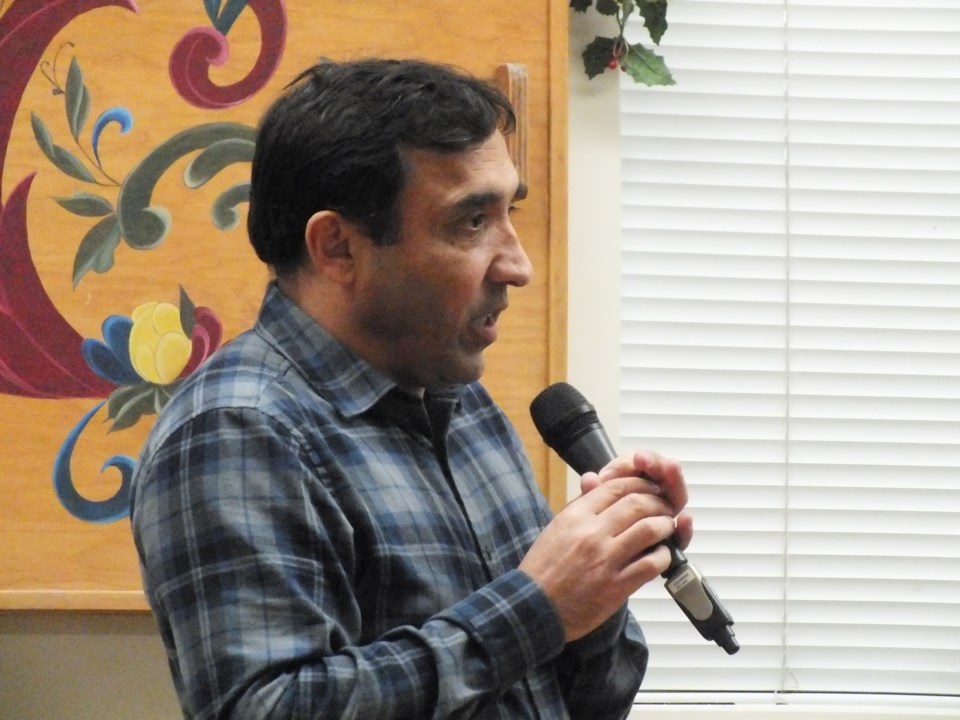On what was perhaps the first real work day of 2023, an internationally experienced sustainable development program expert described his work in community service, sustainable development, and bringing hope to small villages at the Cochrane Rotary Club’s first monthly meeting of the new year.
As it turned out, Ashraf Karim of the HiMaT Pakistan Project also graced attendees on Jan. 3 at the Cochrane Legion with his beautiful singing voice, delivering a song relevant to his experiences travelling the world.
The song was about how difficult it is to live away from loved ones.
Karim spoke about what is different about the HiMaT approach than any other development programs that have come to northern Pakistan, and why after 14 years, there is still a huge groundswell of support at the grassroots level for the ongoing project.
The HiMaT Indigenous Leadership and Development Project was born in 2009 out of several years of pilot efforts in Pakistan and elsewhere, informed by lessons learned from poverty alleviation efforts around the world.
The project formed a new partnership between an indigenous non-governmental organization in northern Pakistan and groups from Europe and Canada.
The goal of the project was to establish a prototype training and support centre based on work in one small valley in Pakistan with 11 villages, that would work with indigenous institutions, leaders, and communities to build capacity for sustainable human wellbeing and prosperity.
The project is training some 100 development activists and entrepreneurs, who then take the training to more than 2,500 grassroots learners through "learning and action" circles.
Karim said if he had to pick one key message, the most important challenge for people looking to make their countries better, it would be to stress the importance of starting at the community level.
It’s a message that would likely resonate with displaced Ukrainians around the globe.
“In the current scenario around the world we need trust among communities, among nations, to harmonize life, as human beings together,” Karim said.
“And you have to build it from the grassroots level, to engage everyone together, and extend support to each other, and show sympathy and kindness to everyone, and make a peaceful home for everyone.”
One of the other key takeaways from the project in Pakistan is how important women were in getting new entrepreneurial initiatives off the ground.
“In most developing countries, governments have the ability to contribute to community development, but due to culture, social (issues) and religion, they do not get the opportunity to come forward,” he said.
“But women are the key players at the house level, at the family level, at the village level, so they can mobilize and organize people.”
He said women were already community leaders in many ways, so to get involved in entrepreneurial sustainable development initiatives is a natural progression.
Cochrane Rotarian Alex Baum said Karim’s talk made him reflect on what we have.
“It was a really nice reminder, how good we have it, in Cochrane, in Alberta and in Canada,” Baum said.
“We wake up most mornings taking it for granted how good we have it.”
He said while it’s good to see reports on the international projects, hearing from the actual people doing the work is much more powerful.
“It’s always nice to hear from a local resident, who’s been in the trenches,” Baum said.
Since 2009, the project has grown to cover more than 80 official villages, involving roughly 200 rural communities. The Rotary Club of Cochrane, along with other Rotary clubs in Alberta, and Rotary International, have donated funds to the project since 2018.
During all this time, Karim has been part of the project team, and has been the team leader for the past decade. Under his leadership, more than 13,000 people have taken training courses related to building their capacity to be effective in developing their own selves and their communities.
Roughly 300 new businesses have begun, more than 100 savings and loans programs were built, and 35 revolving funds were established that are run by women's organizations. During the last year, Karim helped to establish an entirely new project site in the southern lowlands of Pakistan in an area called Khanewal, where roughly 40 per cent of the children are stunted, 35 to 40 per cent all residents have hepatitis, and most girls and women are not educated past Grade 5.
Currently, Karim is on a sabbatical from the on-the-ground work in Pakistan because he received a World Bank scholarship and admission to Brandeis University in Boston, for a Masters in Sustainable Development Program.
He visited Cochrane on a term break, and returned to the university this week. Karim was staying in town with Judie and Michael Bopp, members of the Rotary’s International Committee.
Before leaving, Karim said he was loving his visit to Cochrane, despite his visit kicking off during a recent cold snap.
“I experienced extreme cold weather beyond my imagination,” he said with a smile.



